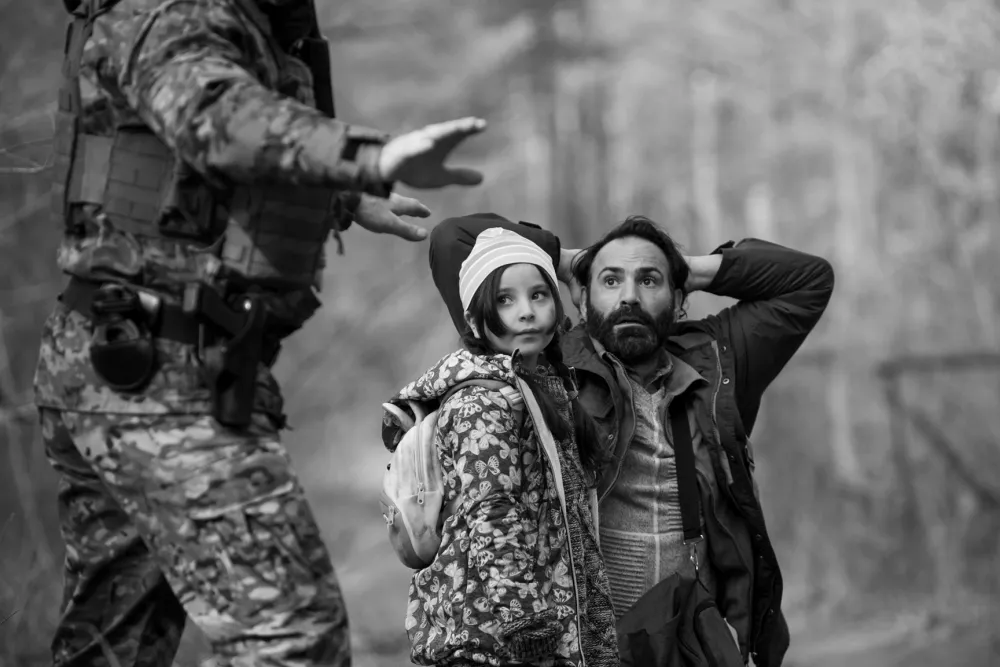In Green Border, director Agnieszka Holland turns a devastating lens on the European refugee crisis, crafting a grim and necessary experience that challenges not only our empathy but our understanding of human decency in the face of political cruelty. The film opens with the innocent beauty of an aerial shot, where the vast green expanse of a forest seems to promise something peaceful, even hopeful. But this tranquil landscape quickly fades to black-and-white, a visual choice that underscores the stark and brutal realities that will follow. What we’re about to witness is not a tale of scenic borders but of a barren, tortured space between nations that has become an arena for human suffering.
The narrative follows a group of refugees, including a Syrian family and an Afghan woman, who are deceived into thinking they can find asylum in Europe. Lured by the false promises of Belarusian propaganda, they soon discover the hellish truth—that they are merely pawns in a political game, trapped in a no-man’s land at the Belarusian-Polish border. Holland's portrayal of their relentless suffering, passed back and forth like unwanted cargo between two countries, is unflinching. The refugees, subjected to violence, exploitation, and abject cruelty by border guards, face a grim cycle of dehumanization. One striking image in particular—a pregnant woman thrown over a razor-wire fence—is a haunting symbol of the complete disregard for human life at the border.
Yet, amid this bleakness, Green Border finds space for human solidarity and unexpected heroism. Julia, a psychologist played by Maja Ostaszewska, is drawn into the struggle when she responds to a desperate call from a refugee group near her home. Her character undergoes a subtle transformation, from a detached, privileged figure into a quiet radical, joining forces with anarchist volunteers to rescue stranded migrants. The film gradually morphs into a heist thriller of sorts, with Julia and her comrades planning a daring rescue. This shift in tone, while surprising, never undercuts the seriousness of the film’s message, instead offering a glimmer of hope within its dark narrative.
What sets Green Border apart from many political dramas is its refusal to manipulate emotions with cheap sentimentality or music. Holland’s direction is direct and restrained, presenting violence and injustice without embellishment, making the cruelty all the more chilling. The film’s structure is episodic, shifting between various perspectives, but the focus remains on the refugees—the true victims of this geopolitical debacle. While the Polish soldiers and border guards are painted as the antagonists, some, like the character of Jan, played by Tomas Wlosok, are portrayed with complexity, caught between their orders and the moral weight of their actions.
The film’s critical edge is sharpest when it examines the hypocrisy and selective compassion of European asylum policies. Poland, which rigidly rejects refugees from Belarus, later opens its doors to the millions of Ukrainians fleeing war—a contrast that Holland underscores with a sly epilogue that forces the viewer to confront uncomfortable truths about racial and political biases in international migration. This, after all, is not just a film about Poland or Belarus; it’s a timely and urgent meditation on borders and the people who suffer for them, making it impossible to ignore the parallels with the ongoing migrant crisis elsewhere in the world, from the U.S.-Mexico border to the Mediterranean.
Holland, who has long excelled at finding nuance in complex historical and social dramas, brings an unflinching clarity to Green Border, an essential film that will haunt viewers long after the credits roll. In a time when it’s easy to look away from the suffering of others, Green Border demands our attention, urging us to ask not just how much suffering we can endure as witnesses, but how much cruelty we will allow to persist unchecked in our own time. The film’s harrowing portrayal of human suffering and political cruelty makes Green Border anything but an easy watch. Its unrelenting depiction of the refugees’ pain, coupled with the stark realities of border control and dehumanization, will undoubtedly leave viewers unsettled. Yet, this discomfort is exactly what makes it a necessary and urgent film. Holland’s uncompromising vision forces us to confront uncomfortable truths, ensuring that the impact of the film lingers long after the final frame. It's a challenging cinematic experience, one that demands empathy, reflection, and a reckoning with the world we live in.
Green Border opens in select Australian cinemas on 28 November, with screenings at Perth Festival from 17 - 23 March 2025.
Director: Agnieszka Holland
Cast: Jalal Altawil, Maja Ostaszewska, Behi Djanati Atai
Writers: Maciej Pisuk, Gabriela Lazarkiewicz, Agnieszka Holland
Producers: Fred Bernstein, Agnieszka Holland, Marcin Wierzchoslawski
Music: Frédéric Vercheval
Cinematography: Tomasz Naumiuk
Editor: Pavel Hrdlicka
Streaming Availability:

